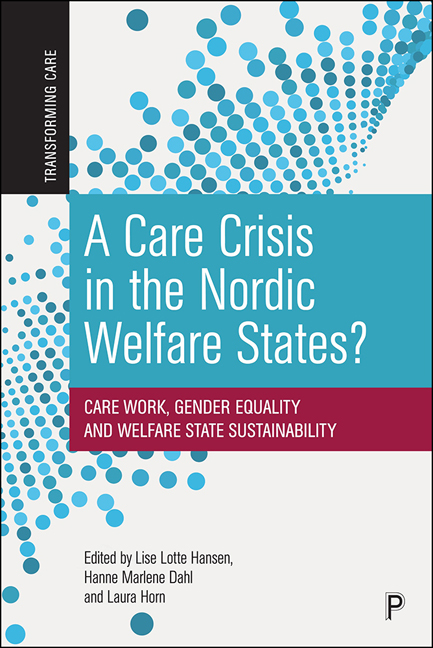 A Care Crisis in the Nordic Welfare States?
A Care Crisis in the Nordic Welfare States? Book contents
- Frontmatter
- Contents
- List of tables
- Notes on contributors
- Preface
- 1 Introduction: A care crisis in the Nordic welfare states?
- 2 The ‘care crisis’: its scientific framing and silences
- 3 Fraser’s care crisis theory meets the Nordic welfare societies
- 4 Crisis of care: a problem of economisation, of technologisation or of politics of care?
- 5 Deteriorating working conditions in elder care: an invisible crisis of care?
- 6 Managerialism as a failing response to the care crisis
- 7 ‘We are here for you’: the care crisis and the (un)learning of good nursing
- 8 Professionalisation of social pedagogues under managerial control: caring for children in a time of care crisis
- 9 Raising quality in Norwegian early childhood centres: (re)producing the care crisis?
- 10 Conclusion: Less caring and less gender-equal Nordic states
- 11 Postscript: A care crisis in the time of COVID-19
- Index
1 - Introduction: A care crisis in the Nordic welfare states?
Published online by Cambridge University Press: 13 May 2022
- Frontmatter
- Contents
- List of tables
- Notes on contributors
- Preface
- 1 Introduction: A care crisis in the Nordic welfare states?
- 2 The ‘care crisis’: its scientific framing and silences
- 3 Fraser’s care crisis theory meets the Nordic welfare societies
- 4 Crisis of care: a problem of economisation, of technologisation or of politics of care?
- 5 Deteriorating working conditions in elder care: an invisible crisis of care?
- 6 Managerialism as a failing response to the care crisis
- 7 ‘We are here for you’: the care crisis and the (un)learning of good nursing
- 8 Professionalisation of social pedagogues under managerial control: caring for children in a time of care crisis
- 9 Raising quality in Norwegian early childhood centres: (re)producing the care crisis?
- 10 Conclusion: Less caring and less gender-equal Nordic states
- 11 Postscript: A care crisis in the time of COVID-19
- Index
Summary
Care, and being in need of care at various points of your life, is a condition of our existence. We can't live without giving and receiving care. You wouldn't be here reading this text without having been cared for as a baby. Being fed, bathed, nappies changed and having clean clothes put on. Care is embedded within practices in various institutional contexts, including the home, the hospital, the crèche and the nursing home. In these contexts most people are ‘doing good’ (Mol, 2007) in relation to those that are currently sick, disabled/challenged, children or fragile. Those that are doing less well need to receive help, support and coaching in a dialogic, ongoing, although possibly fragmented, process and adjust to the care provided. Throughout life we experience being dependent upon others to maintain our existence – or improve it. Care can be a burden, and care can create pleasant feelings of belonging, doing something together, doing good, and being seen as someone in need of care, or someone providing care. Care can be paid and unpaid, but regardless of this, it constitutes ‘care work’ as one of the founding mothers of Nordic care research, Kari Warness, has argued (Warness, 1982).
In this book we discuss the status of care work, and especially paid care work, in the Nordic welfare states in light of the neoliberal turn in welfare politics, and what this means for gender equality and the sustainability of the Nordic welfare state. When care work is commodified i.e. paid either in a market or by the state, it simultaneously becomes a public form of care work. Our focus is upon formalised care work, that is, care that is commodified (paid), regulated politically and ‘performed’ within the state or private institutions. By institutions we refer to conglomerations of practices in process (Bacchi and Rönnblom, 2014). The discussions in this book develop around the theoretical questions of what constitutes a care crisis, whether it can be expanded beyond its original application into a different context and rethought; a methodological question of its operationalisation (how to investigate it), and an empirical question about the justification of talking about a care crisis in the Nordic welfare states. Finally, we discuss the major areas of concern in terms of gender equality and elements of social sustainability in a situation of care crisis.
- Type
- Chapter
- Information
- A Care Crisis in the Nordic Welfare States?Care Work, Gender Equality and Welfare State Sustainability, pp. 1 - 19Publisher: Bristol University PressPrint publication year: 2021
